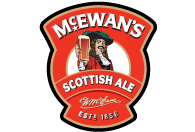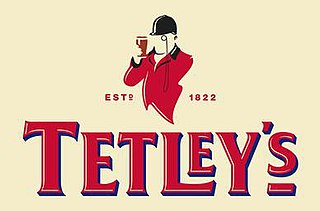
John Smith's Brewery in Tadcaster, North Yorkshire, England, produces beers including John Smith's, the highest selling bitter in the United Kingdom since the mid-1990s.

Marston's plc is a British brewery, pub and hotel operator. It was known as Wolverhampton & Dudley Breweries plc until 2007 when it rebranded as Marston's. It is listed on the London Stock Exchange.

Carlsberg A/S is a Danish multinational brewer. Founded in 1847 by J. C. Jacobsen, the company's headquarters is located in Copenhagen, Denmark. Since Jacobsen's death in 1887, the majority owner of the company has been the Carlsberg Foundation. The company's flagship brand is Carlsberg. It also brews Tuborg, Kronenbourg, Somersby cider, Russia's best-selling beer Baltika, Belgian Grimbergen abbey beers, and more than 500 local beers.

McEwan's is a brand of beer owned by Marston's Brewery. It was originally brewed by William McEwan's Fountain Brewery in Edinburgh, Scotland. The McEwan's brand passed to Heineken in 2008 after their purchase of Scottish & Newcastle's British operations. Heineken sold the brand to Wells & Young's in 2011, who sold their brewing operation, including the McEwan brand to Marston's in 2017. Cans and bottles are now brewed in Bedford, England.

Cains is a former brewery in Liverpool, England, founded in 1858 by Robert Cain. The company merged with Peter Walker & Son in 1921 to form Walker Cains. Peter Walker & Son had a large brewery in Warrington so sold its Liverpool brewery to Higsons in 1923. Boddingtons of Manchester took over in 1985. In 1990 Whitbread acquired Boddington's brewing operations and closed the then Higsons Brewery in 1990. It was reopened by GB Breweries, who became part of Bryggerigruppen in 1991, and in 2002 was sold to Gardener-Shaw for £3.4 million.

Brewerytown is a neighborhood in the North Central Philadelphia district of the city of Philadelphia, Pennsylvania, United States. An unofficial region, Brewerytown runs approximately between the Schuylkill River's eastern bank and 25th Street, bounded by Cecil B. Moore Avenue to the north and Parrish Street to the south. Brewerytown got its name because of the numerous breweries that were located along the Schuylkill during the late 19th century and early 20th century. It is now primarily a residential neighborhood, with a growing and active commercial sector along Girard Avenue.

The Worthington Brewery, also known as Worthington & Co. and Worthington's, was founded by William Worthington in the English Midlands town of Burton upon Trent in 1761. It is the second oldest continuously brewed British beer brand after Whitbread. The best known Worthington beers are the Creamflow nitrokeg bitter and White Shield India Pale Ale.
Higsons was a brewery in Liverpool, England, founded in 1780 and closed by Whitbread in 1990. Higsons beer was brewed in Sheffield and Durham after closure before being discontinued. The brand has been revived in the 21st century.

Firestone Walker Brewing Company is a brewery in Paso Robles, Central Coast California, and Buellton, California. Firestone Walker is California's fourth-largest craft brewery and is known for producing hoppy ales. Firestone Walker was the sixteenth largest craft brewery in the U.S. in beer sales volume in 2014.

Ansells Brewery (Ansells) was a regional brewery founded in Aston, Birmingham, England in 1858. It merged with Taylor Walker and Ind Coope in 1961 to form Allied Breweries. The brewery remained in operation until 1981, after which production transferred to Allied's Burton upon Trent brewery; some former staff setting up the Aston Manor Brewery.

Robert Cain (1826–1907) was the founder of the firm Robert Cain and Sons, a brewer in Liverpool, England.
Allied Breweries was the result of a 1961 merger between Ind Coope, Ansells, and Tetley Walker.
Burton upon Trent has a long history of brewing, at one time exporting beer throughout the world and accounting for a quarter of UK beer production; emulation of Burton water in brewing is called Burtonisation. Much of the town was given over to the industry throughout the 19th century and brewers dominated it politically and socially.
Watney Combe & Reid was a leading brewery in London. At its peak in the 1930s it was a constituent of the FT 30 index of leading companies on the London Stock Exchange. It produced Watney's Red Barrel.

Stones Brewery was a brewery founded in 1868 by William Stones in Sheffield, West Riding of Yorkshire, England, and purchased by Bass Brewery in 1968. After its closure in 1999, its major brand, Stones Bitter, has continued to be produced by the Molson Coors Brewing Company.

Tetley's Brewery(Joshua Tetley & Son Ltd) was an English regional brewery founded in 1822 by Joshua Tetley in Hunslet, now a suburb of Leeds, West Yorkshire. The beer was originally produced at the Leeds Brewery, which was later renamed the Leeds Tetley Brewery to avoid confusion with a microbrewery of the same name.

Sir Andrew Barclay Walker, 1st Baronet was a brewer and Liverpool Councillor.

Camerons Brewery Ltd is a brewery established by John William Cameron in Hartlepool, County Durham, England in 1865. It is the largest independent brewer in the North East of England, with a brewery capacity of 1.5 million hectolitres and a tied estate of 75 houses. It is one of the oldest industrial concerns in Hartlepool, and has historically been one of the largest employers.
Peter Walker was the owner and master brewer of the Fort Brewery in Ayr, Scotland.

The history of Warrington began when it was founded by the Romans at an important crossing place on the River Mersey. A new settlement was established by the Saxons. By the Middle Ages, Warrington had emerged as a market town at the lowest bridging point of the river. A local tradition of textile and tool production dates from this time. The expansion and urbanisation of Warrington coincided with the Industrial Revolution, particularly after the Mersey was made navigable in the 18th century. Warrington became a manufacturing town and a centre of steel, textiles, brewing, tanning and chemical industries.